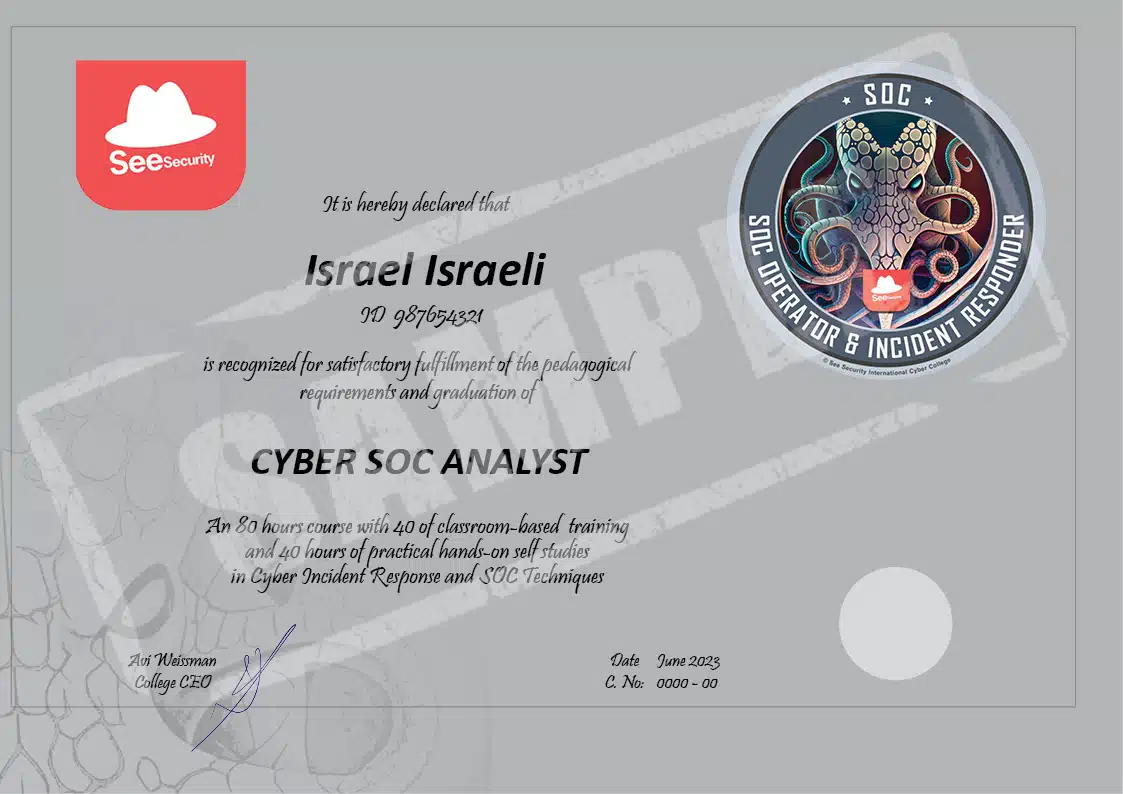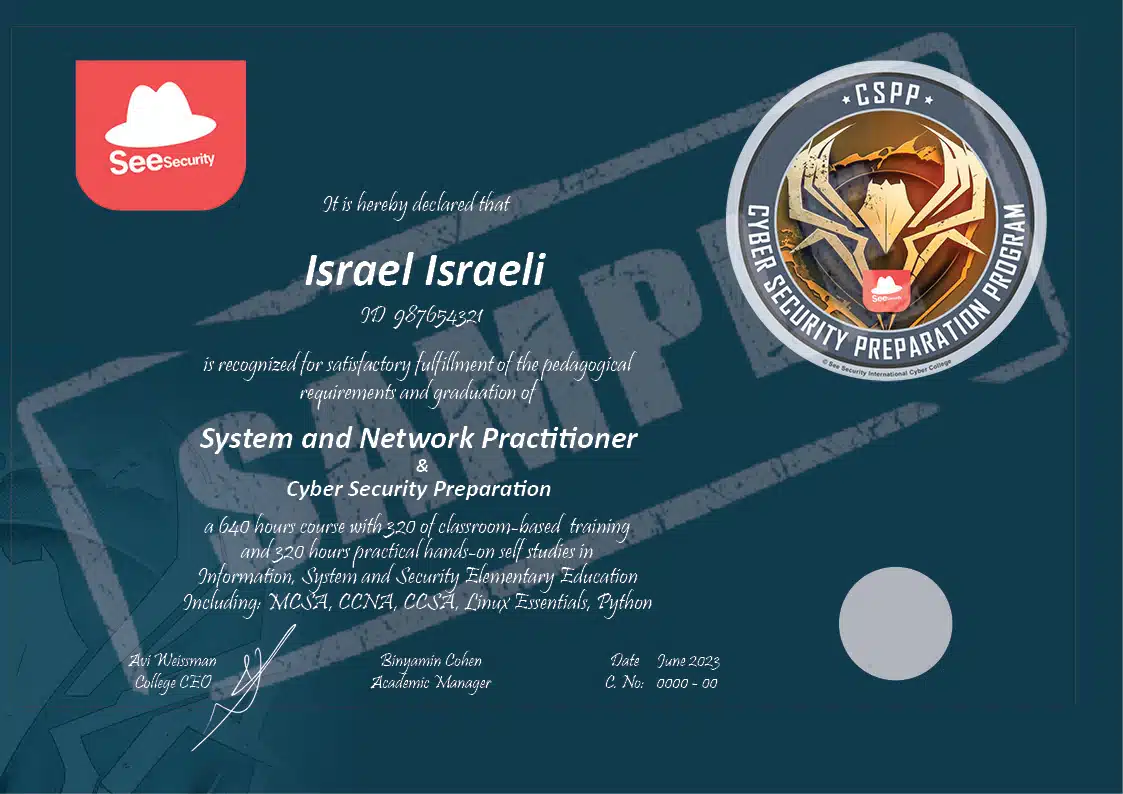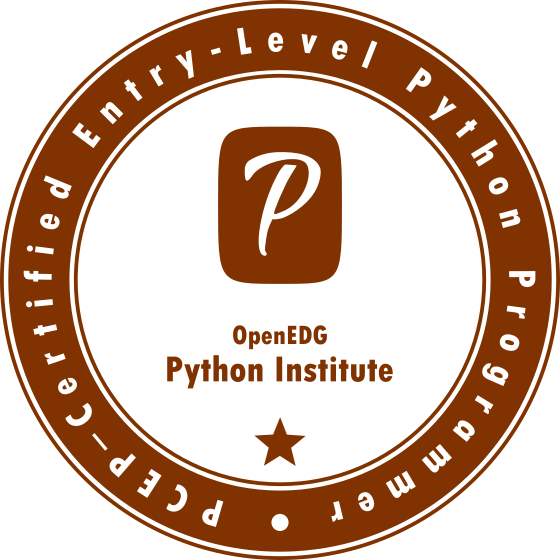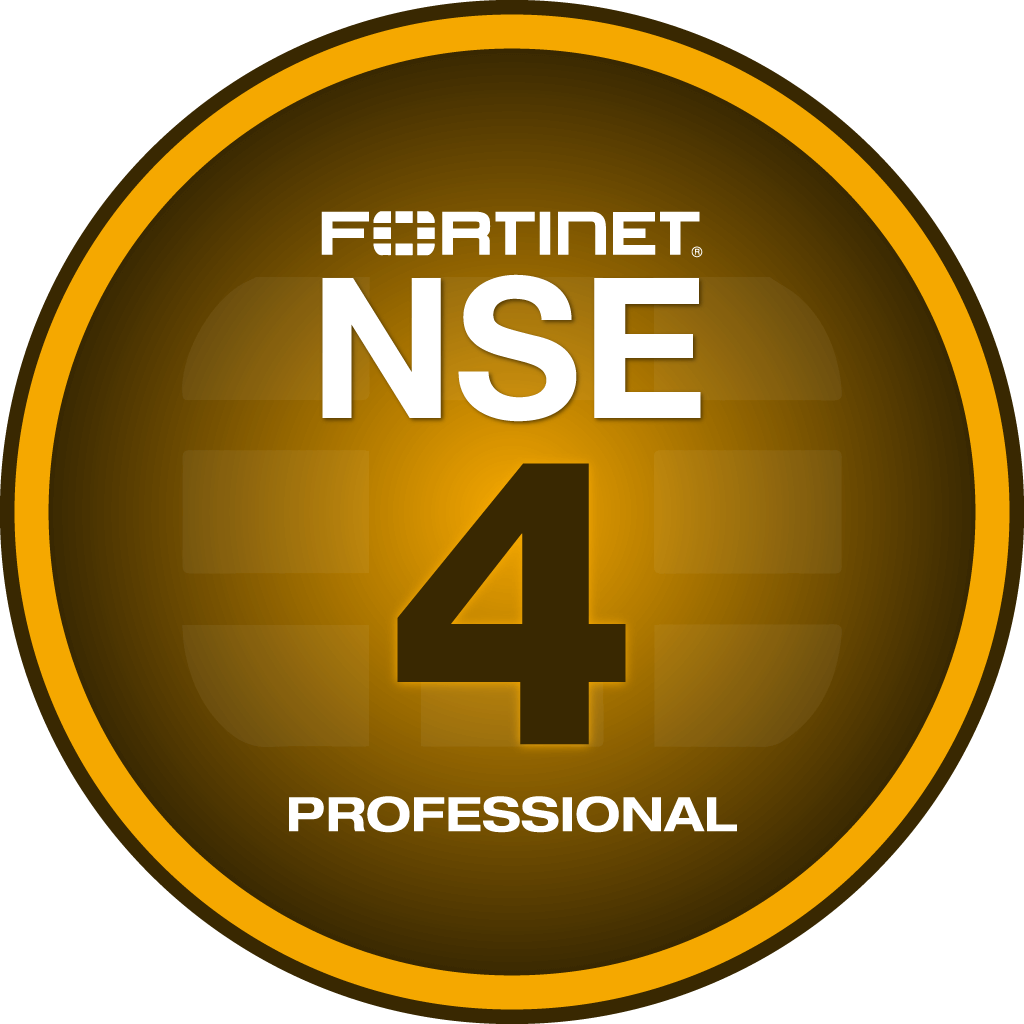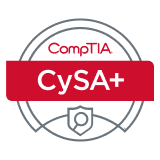CYBER SECURITY PREPARATION & SOC Analyst COURSE
CYBER SECURITY PREPARATION & SOC Analyst COURSE // CYBER SECURITY PREPARATION & SOC Analyst COURSE //
SyllabusBEGINNERS
level/floor
9 Months
Duration
320
academic hours
26.06.2025 Cycle 99
Course Opening Date
Mon + Thu 17:30-21:30
Days & Hours

- About the course
- Credentials
- Certifications
- Study Divisions
- Lecturers
- year before
- Learn More
01
About the Curriculum
Your career in cybersecurity starts here.
See Security College has built an integrated program to study network management, cyber fundamentals, and training for SOC (Security Operation Center) controller (SOC Analyst Tier 1). The curriculum includes six key topics: Microsoft server management (MCSA), management and setting CISCO communication systems (CCNA), Fortinet Firewall communication systems security, LINUX operating system basics, PYTHON programming basics, and SOC studies that will give you robust foundations for advanced cyber studies.
This program constitutes your 'entry ticket' into the cybersecurity world. The knowledge contained in it is mandatory for anyone who wants to enter the high-tech world in general and the cybersecurity world in particular and go forward further, to advanced professions, positions, and specialties in the cyber industry.
After completing the course, you will be able to choose in-depth continuing studies in one of the core subjects of cybersecurity. Our School Counselors will provide additional information.
Read more
02
Course Purpose
The combined curriculum of Cyber Basics, Network Managers and SOC Analyst - is designed to train Network Administrators, Controllers/Communication Managers and SOC Controllers (Tier 1).
The many extensions and additions in the program are designed to create a generation of graduates with an advantage in the labor market and prepare them to professionalize one of the most advanced cyber professions later in their career.
The program prepares students for a variety of certification exams: Cisco CCNA, Fortinet NSE4, Linux LPI and Python Essentials. In addition, you can take the CompTIA Cysa+ certification test, which is considered an International Quality Mark for SOC controllers. The program prepares the graduates for network management and information security roles and for initial roles in cyber defense.
Read more03
Program and Scope of Studies
Frontal studies on campus in Ramat Gan (also available online), twice a week between 17:30-21:30 (Week days) or in the case of Fridays between 09:00-13:00.
Scope: 320 academic hours and 350 hours of home training.
Duration: 9 months.
Read more04
Target Audience
This broad program is perfectly designed for novice without prior background in computers who want to acquire a high-tech profession or perform a conversion to high-tech, while specializing in deep knowledge of networks, servers, and cybersecurity essentials. Graduates of this program interested in continuing to study advanced cyber professions, are entitled to a special price in admission of additional program. Full details with the school counselors.
Read more05
Admission conditions
English reading, basic computer skills, full matriculation or 12 years of study (or with the approval of the Exceptions Committee), participation in a professional counseling session and career planning with the progaram's manager.
Read more07
Post course work
Why wait till the end of the course?
The program manager and lecturers will teach you how to start working in the studied professions, during course period and will expose you to dozens of relevant jobs offers that have been tested and found to be suitable for the stage in which you are in the course. You choose the most suitable offer! Possible roles during the course: technical support, organizational technical support (PPC), NOC communication systems control, and more.
At the end of the course: roles in network management, system management, SOC.
Read more08
Recognition
See Security is known as a college with the highest level of study, conducted in a social and cooperative learning atmosphere. The professionals, IT managers in Israel and employers of all kinds, are well acquainted with the college and its demands from the students and prefer to take in the ranks of graduates who have been filtered, trained, and tested through their studies in the college.
Read more09
Curriculum Tasks
80% attendance
A score of 70% in the submitted assignments
Extensive Practice in class and home (Hands-on Computer Labs).
Read more10
Program Benefits
Why is the program so different from regular networks studies?
From the college administration's perspective, integration of students and graduates into relevant positions is the only measure for success. Therefore, the program was built according to the requirements and expectations of employers. Employers demand and expect that a graduate of a cyber-specific college like See Security will reach a more mature, will be skilled and equipped with multidisciplinary knowledge.
The program combines different areas that are converging to the spectrum of roles that the graduates can perform: Windows + Linux operating systems, communication systems in accordance with Cisco-CCNA certification, Firewall security and basic Python programing.
It is worth remembering that the candidate's "competitor" is not the employer. On the contrary, he seeks the best for himself. When employers agree to register a beginner, they expect at least to have more knowledge than candidates from common training companies.
Read moreCredentials
DIPLOMA
CERTIFICATES
11
In this chapter we will get to know the basics, concepts, and the foundation of the world of networks and infrastructure. We will create a common language; we will learn basic concepts in the profession and establish knowledge of the main elements for the next few months.
- Basic Concepts in Computer Communications
- OSI Protocols and Model
- IPv4 numbering methods and addresses
- TCP–IP Stack
- Other Communication Standards
- Addressing
- OS Basics, Virtualization, Network components
The world of infrastructure management and communication networks by the market leading technology giant - CISCO Global.
Among the topics we will deal with are network management with regard to logical and physical networks, working with excluded sub-networks, creating managed network traffic while optimizing bandwidth and controlling data, creating load balancing and managing failure points by creating redundant systems in the network infrastructure, and more ...
The CCNA will prepare for certification and will focus on managing your network infrastructure at all levels. During the program, the student will gain in-depth knowledge and understanding of network management technologies - from small networks to Enterprise networks - as well as practical application of the theory in laboratories and physical equipment.
Project: Construction of complex networks environment
Introduction to cybersecurity as we know it today. Basic concepts in cyber, attack types and attacks, weaknesses and vulnerabilities. Defense tools and technologies are commonly used in the establishment of cyber defense. This session places the building blocks for entering the cybersecurity world for the wrest of the course and prepares for next courses in the future.
Management of enterprise computing systems based on Microsoft Active Directory Servers Identity management (IAM), object management and information security in an organization managed by Microsoft server systems.
This provident prepares the student to work in the field of server management and familiarity with all the basic tools a network administrator needs to know in Microsoft environments, such as: File servers, DC servers, DNS and more... alongside the hardening of the end stations and the security of the organization by GPO.
Project: Building a complex server-client environment
Practice in information security worlds by implementing and in-depth knowledge of Firewall technologies. In this section, the student will be familiar with all the basic concepts and techniques commonly used in firewalls management settings.
The application focus will be on the security giant Fortinet Global products and its flagship product, FortiGate - the most common firewall in Israel today.
During the course, the student will practice and implement many security tools such as: VPN, DMZ, URL Filter, Application control, VIP and more...
Project: Building a Cyber Defense System for the Network
Entering the worlds of Linux - a common operating system in cybersecurity environments and systems. During the program, the student will become familiar with the basics of Linux operating system, acquire knowledge and practice in scripting and Linux-based system management. It also prepares the student for LPI certification.
Among the various programming languages - Python language is the leader in managing and operating network devices, and therefore every future cybersecurity expert must acquire basic knowledge and control of this language. This language became very popular because of the ability to understand it and quickly control it even for those who do not really connect to programming (e.g. System people). During the course, students acquire the knowledge required to get to know this language, perform a final project and access the international certification PCEP.
Many organizations own a cyber event control center - this center has monitoring and control systems for all network traffic and digital activity of the organization. The monitoring and response work for cyber events at this center is carried out by analysts, who acquired the knowledge and experience in identifying and treating cyber events in real time.
In this class, the students acquire broad knowledge and experience using special simulation environments, which were created especially for this course to train the best Tier 1 SOC Analysts.
LECTURERES
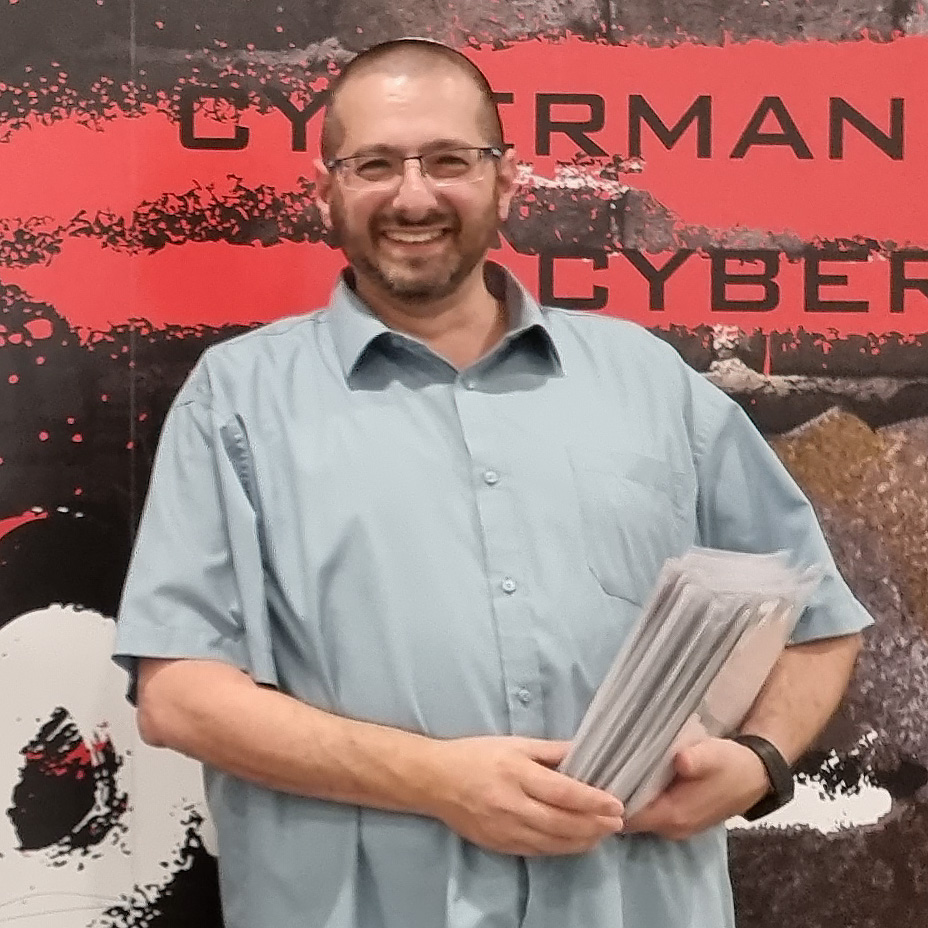

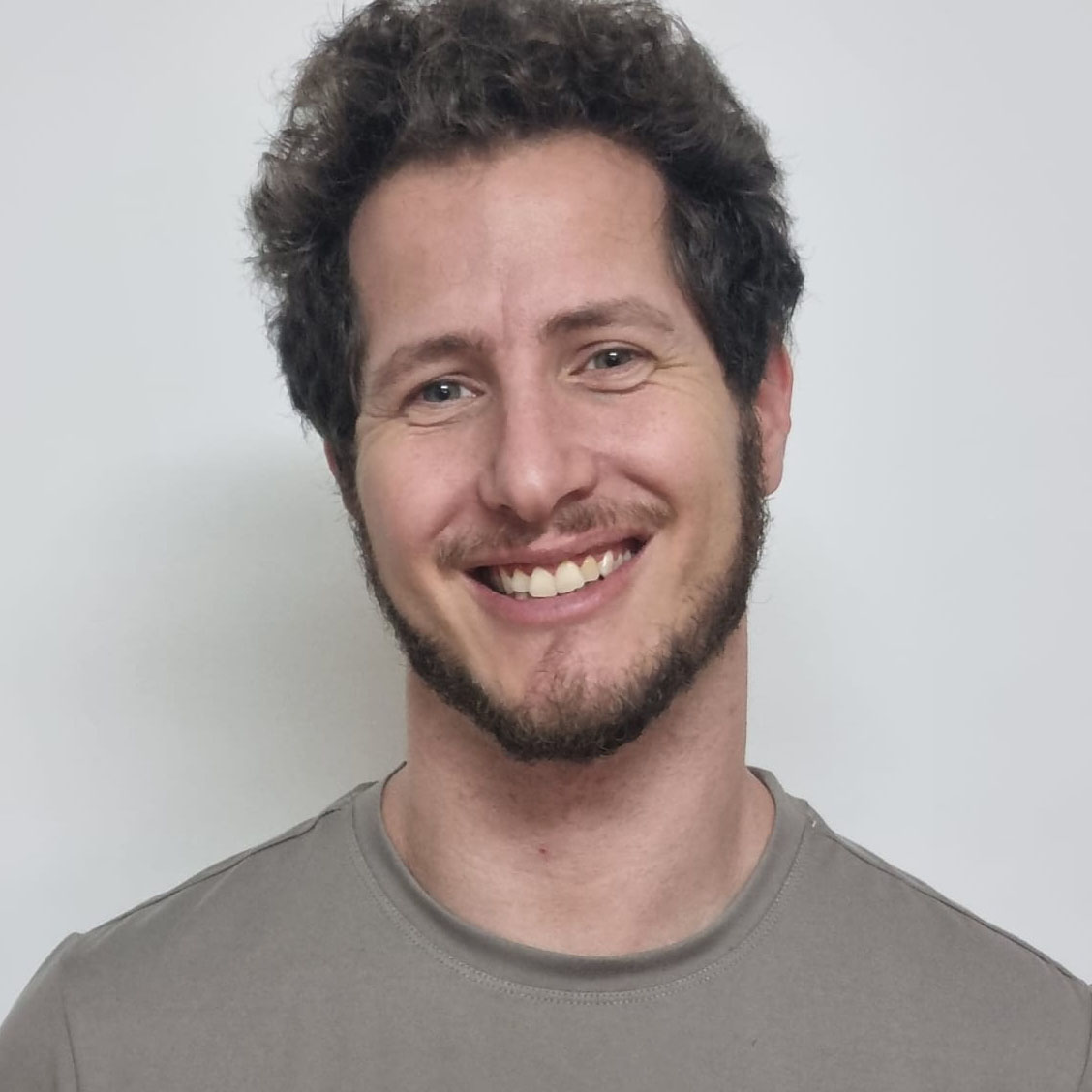


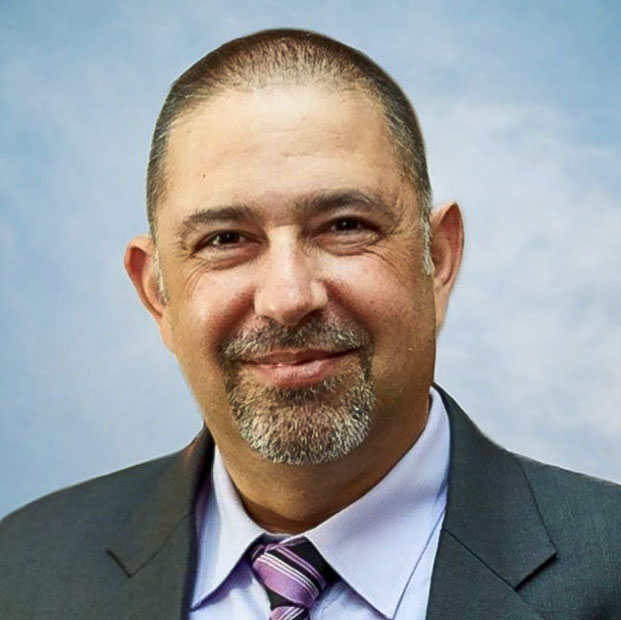



02-2025

SOC ANALYST, Cyber Basics and Network Managers Program - Graduates
More Info
The term "cybersecurity" replaced (generally speaking) the older term "information security".
- Communications and computers development is also known as the "digital revolution", in which all computers in the world are connected or connected technologically. This new situation has resulted in hostile actors being able to exploit the "connectivity" and "dependency" in their interest.
- Why did the cybersecurity industry evolve so quickly? Because humanity depends on computers. Absolute dependence.
- Why is it so hard to protect data and enterprise systems? Because there is a conflict of interests: on one hand, the digital revolution is working to improve the "connectivity and openness", on the other hand, in the gap that opens, we must carry out the "opposite" action of limiting criminals.
- Any organization is required to protect all its external borders, including the customers' data, suppliers, and partners, and all its internal spaces despite their differences and the different interests of departments and individuals. The hacker, the attacker, needs only one small spurt, and from there he can continue to creep either secretly or openly, right up to the targets.
- The issue of cyber defense has become a complex, critical and dangerous subject for any organization to exist in the current era, requiring a very wide range of concurrent operations of various factors to sustain both adequate defense and ongoing, essential activities for the organization's goals.
- That's why the cybersecurity field has grown and evolved significantly in recent years. It offers many areas of expertise such as network and infrastructure security, application and data storage security, security testing, IT auditing, business continuity planning, electronic record discovery, digital legal system and more...
- Information security professionals receive recognition, and their jobs are guaranteed and relatively very stable. The complexity and large scope of the required knowledge has led to the fact that there are completely different professions in cybersecurity, since no one is able to master all the knowledge involved in cybersecurity and all simultaneous actions required for comprehensive cyber protection.
After the great revolutions that took place since the day of human domination (the discovery of fire 20,000 years ago), the agricultural revolution (10,000 BC), and the industrial revolution at the end of the 18th century, came the digital revolution. Some people consider the digital revolution to be a part of a larger revolution, the knowledge revolution.
The beginning of the digital revolution could be traced back to 1947, with the invention of the first transistor or in the 1970s, when the Internet was radio accessible to the U.S. military. You can also start in the 1980s, when personal computers became public domain and smartphones came into the world, or in the 1990s when the Internet became accessible worldwide.
The digital revolution brought cyber threats: military, security, industrial, commercial, etc. In fact, caught humanity "unprepared".
All the technologies we know became "digital": airplanes, tanks, vehicles, machines, energy systems, medical devices (including implanted devices in the human body for saving lives or improving quality of life), communication devices and more.
All these measures are subject to cyberattack.
The effect is threatening countries, both economically and militarily. Thus, the whole world began to develop cybersecurity knowledge and cyber-attacks as amok percentages. It is not about economical choices, but about the lack of choice.
At any point or time during the digital revolution, a new problem has developed: communication has become so accessible it is actually "reaching out" to digital burglars, just as an open door "call" a conventional thief.
The industry that deals with protecting the new breaches caused by totally accessible communication, is called Cybersecurity.
Here's a basic list. There are other professions and other specialties, and you can read about them in the many articles on the site. All subjects are on the "2nd and 3rd floor", and to advance to these professions and specialties, you must pass through the "1st floor" - the "cyber lobby" program or gain knowledge and experience on subjects learned in the program.
- SOC (SOC Analyze) - The first level of cyber security, whose role is to monitor suspected events. An analyst at SOC is required to respond to events at the time of discovery, identify signatures, decrypt the data packets and carry out relevant risk assessment to the organization’s resources arising from the event. In addition, an audit will be conducted against the organizational system logs that could have been affected by the event: applications, databases, Web servers and others, workstations, network resources and more.
- CSP: Cyber Security Practitioner - In fact, the Director of Cyber Security Technologies (Integrator), who is responsible for the operation of the information security tools in the organization. The position is similar to a network administrator, but the technologies under its responsibility are extensive and advanced, and deal with protecting information, communications, storage and computers. Unlike the network environment where most common are Microsoft and Linux systems, in a typical organization’s cyber protection environment, there are many manufacturers and a very diverse range of protection tools.
- The architect of cybersecurity, CSTP - Cyber Security Technology Professional, is the "head" behind information protection. He will face the attacker, plan the system, guide the implementers in their work, design the work method, track the events for the purpose of locating an attack, and guide the response and dealing with an attack. Cyberspace is responsible for the design and construction of the protection of all operating systems, networks, code, and applications against hackers. His role will be carried out mainly through instructions to the data security implementation. This position is common in medium and large general organizations and in information security consulting and service companies. In small companies, the role will be performed by the network manager, the system manager, or the communications manager.
- CSMP: Cyber Security Methodology Professional CSMP (Cyber Security Methodology Professional) - Cyber Defense Methodology Expert (Hebrew) - is produced to the Technological Defense Pattern Laws, Rules and Instructions, in order to simultaneously uphold the laws of the company and the state and to implement the defense. The expert will have an academic background, responsible for: (a) formulating, characterizing and realizing perceptions, methods and methodologies for cyber protection in the organization, (b) implementing Israeli and international standards and privacy protection aspects, (c) risk management, (d) accompanying organizational processes in cyber, such as: accompanying the establishment of systems, projects, supply chain, business continuity, etc., while recognizing and understanding the activity, needs and organizational goals.
- CSPT: Cyber Security Penetration Tester - Performs penetration testing for the Enterprise Defense Array. This profession is one of the most complex and sophisticated in the cyber sector, characterized by multi-disciplinary and highly creative. Operating systems, communication over each layer, and in particular various protocols are required for different environments. Programming languages, such as C, Python or Perl, and Assembly, are also required. In addition, cyber defense techniques and tools must be recognized and controlled by various techniques and attack tools. “Advanced Attack” experts will be well acquainted with aspects of infrastructure, Intranet, corporate applications of various types, “Reverse Engineering”, unique and sensitive environments such as Cloud, IoT, Mobile and more.
- CSFP: Cyber Security Forensics Professiona - A specialist with practical knowledge and abilities in the fields of Data Recovery, Event Resolution, Reverse Engineering, Vision Preservation, Real-Time Investigation and X-Post Investigations, Knowledge of the legal aspect and the bodies of investigation, and the ability to write a test report.
- CSMA: Cyber Security Malware Analyst uses existing tools to identify known techniques and to test the operating system and components to deal with highly advanced malware. While existing tools provide some of the required insights of simple malware, they are limited in their ability to identify new variants without a human expert.
- An expert (architect) of application security (ASP: Application Security Professional) leads developers to a secure software maker by applying secure programming techniques to unattached design from logical faults and technical flaws. This expert is responsible for securing the client's software, so as not to be a target for an attack or a vulnerability in the enterprise defense system used by the software. He is responsible for integrating security tools, standards, and processes into the lifecycle of the development and product SDLC, to guide the development and QA departments to work securely, ensuring that all stages of the product are as secure as possible and maintaining integrity, secrecy and proper development.
The rapid development of the digital crime epidemic caused a need for diverse professionals to complement one another and to provide an adequate response. The knowledge required for protection is too broad and too varied to fit within an individual, so a group of professionals in different disciplines is required.
The modern era is dominated by members of the "blue collar", but there is a shortage of thought-provoking elements across the economy: medicine, engineering, economics, computers and more. Now that a new industry is emerging, the world is having trouble keeping up with the required production of cyber-defense knowledgeable. The outlook for decades ahead is like this: severe shortage of professionals, all over the world.
Google-sponsored advertising can be helpful in the short term and create an immediate response, but over time small talk prevails. See Security's CEO exerts all his power to excel at the training level of the college, and continuously raise the pedagogical level.
Professional training of a person, or converting a professional to the cybersecurity sector, requires three elements:
- Proper, gradual, uncompromising learning, close supervision, and education for effort, with personal assistance and an option to repair a pedagogical condition for a struggling student (reeducation insurance).
- Starting a job at the beginning of studies with a relatively basic job in the IT industry, which has a shortage of manpower and from there, climbing the employment ladder, without shortcuts.
- Cultural change: conversations on cyber between the college walls, and no less important: bringing students into professional groups dealing with cyber on social networks.
We don't believe, for example, in On-line distant learning. We prefer class-based guidance and the personal touch of a professional lecturer.
That's why so many of our graduates, become real-world professionals.
To start a real career in cybersecurity you must acquire a "toolbox" in network management accompanied with some essential additions, so you can maintain a sufficient level of knowledge to move to the second stage - the advanced cybersecurity professions.
The "toolbox" contain these domains:
1. Server Management - Microsoft Windows Servers - based on MCSA certification.
2. Computer communication based on Cisco CCNA - or CompTIA Network+.
3. Linux operating system - basics - based on LPI Linux Essentials certification.
4. Firewall - based on Fortinet NSE 4 certification (or other possible manufacturer).
5. Basic Python programing.
6. SOC Basics – Tier 1 responder.
The curriculum which includes these domains is called "SOC Analyst, Cyber Basics and Network Administrators." It's a nine-month program, in two-week evening training, 320 class hours, plus about 350 hours of individual assignments.
In a large organization steeped with professionals, there are several different complementary roles such as: technician, system manager, external communications manager (WAN), network manager (LAN), technical support. In this case, the "Administrator" is working behind the scenes quite a lot for the functioning of the system, in conjunction with these officials.
In a small organization, all infrastructure professions or some of them are in one position, which can be referred to as a "Network Manager" or "System Administrator" which is more common to those who are more concerned with the operating systems, and "Network Administrator" to those who are more concerned with the media.
During the personal consultation interviews for beginners, we usually present it this way:
After 9 months of study, you receive 2 marks:
- The first one marks you as a "Stupid and Fat Networks Manager" (please do not be offended, explanation follows).
- The second one states you "May move to second floor" and study of one of the advanced cybersecurity professions.
Here is the explanation:
- "Fat" - because you have learned much more than is necessary to be a "Network Manager" at the beginning of your career, because the training is much deeper and wider than basic "network management" training only.
- "Stupid" - because you have no real-world work experience.
How do you get rid of the "stupid" title? See next section.
An answer to young people aged 20 to 35, who lack a significant profession:
- The description below, as of about 80% of IT students and the cyber sector (for adults - other explanation).
- The cyber world "rides" on the IT world. IT skills, whether Hand-on or engineering understanding of IT technologies, are vital to virtually any cyber world over IT.
- In the world of study and personal development it is customary to say that there are three "floors". The first floor is IT, the world of networks or the infrastructure of computing, and the second and third stories are the floors of cyber professions.
- In the "employment" world, we will also add to the analogy "employment stairs" in IT during the first floor.
So here we're talking about, "How do we start?" "How do I get on the track?" Why? Because experience builds up, things are simple and dependent only on your abilities and your technical and mental skills.
The stairs represent various functions of an IT person, from the lower level to the higher, and will be shown below:
- Domestic technical support.
- Technical support for Helpdesk Enterprise or NOC controller
- Assistant Administrator, SOC Controller, or Small Administrator.
- Network manager (primary), infrastructure manager and so on.
- On the first day of school, one should urge a starting student to seek a job as a “home tech supporter”.
"Home Tech Support"
Your home has an internet router you purchased from one of the internet service providers. When you need technical assistance, you call your service provider and reach technical support. There - the team is very experienced in fixing your fault, since you are considered a very "simple" customer, because you only have one router, and it is very easy to spot the fault and fix it.
How is it possible that an "absolute beginner" who has just begun his studies would be able to take this job?
It is acceptable for beginners to have very basic knowledge. If you have basic computer skills even out of a hobby, you will get picked up. If you don't have any background and you're really at zero-knowledge state, you'll be accepted after a month, because the job is easy and simple and repetitive, and on the other hand, the employers always lack supporters, because those rush to the next step and tend to leave, after a short while.
The position is considered "very low" in the hierarchy, the wages are lower compared to the cyber sector and networks. This position must be started and held for several months in a row.
The next role is "Technical Support for Helpdesk Enterprise" or "NOC Controller". They also spend a couple of months in the department.
"Technical Support for Helpdesk Enterprise"
This role is considered higher than a “home supporter” role, and can only be reached if you meet at least two of the following requirements:
- You worked for several months as a home supporter.
- You studied in the framework of the course "Network Management", at least Windows Servers and computer communications.
- You have a strong background in computers, communications, and systems as a hobby.
Helpdesk Enterprise is a technical support center for large company employees. In a large organization, a very large amount of communication systems, media, many servers, diverse programming and more. Entanglement is far beyond the complexity of a home-supporter role that supports individuals with a single media. Thus, the role is complex, greatly advances the knowledge of the student, and contributes to many studies.
Important comment: There are organizations that will offer you this role, but you will be "preoccupied" with apps / software only and not with networks or system. These roles will not contribute anything to you and will keep you away from your cause!
"Network Operations Center"
Network Operations Center is a control center where communication professionals support network issues with remote monitoring and management software for users within the organization. NOC teams are divided according to their level of knowledge and expertise in communication (not cyber). These technical teams keep an eye on endpoints and traffic and can prevent problems prior to emergence.
The level of knowledge and experience in communication greatly assists and improve the student.
What after Enterprise Helpdesk?
Congratulations. Search for a first job as an Assistant Administrator, starting role in a network administrator team in a medium or large organization or even a small administrator.
Typical student question:
Why don't I work as much as I want to during the course (let's say, at my parents' vegetable shop), and only at the end of the course will I become a Real Network Manager?
Because employers don't like quick jumps. Because employers look at several candidates, and they will prefer a candidate who has studied in an orderly fashion, and worked in an orderly fashion, at least on a nearby scale, not a candidate who has "just studied" and never worked on lower steps.
Our path as a college that seeks to uphold European standards is one that puts “student care” on three levels at the same time and is highly aware that the three planes must be chronologically equivalent.
- Organized studies that include a lot of personal home tasks.
- Work from the bottom step, and an orderly and safe ascent up the stairs without parkour.
- Cultural change: joining relevant groups on social networks on Facebook, LinkedIn, and such.
You don't argue with success. Does it work? So, go.
Don't try to be smart. Sophistication goes up with the loss of valuable time that could be used for career climbing.
- "We will take care of your work towards the end of the course".
It is one of the most used forms of Computers & IT Education due to its commercial use for the sale of courses. Individual course marketers promise "a job at the end of studies". Their promise is accompanied by a "signed contract", a term that is insinuated, which only perpetuates the fact that the unfortunate student who does not understand the vaguely legal essence of the contract will not be able to sue anything. The sad fact is represented by the following statement: "If you're good, you don't need me because you'll be kidnapped, and if you're bad, I won't keep my promise anyway." - "You're a nice guy. You'll get a scholarship."
A scholarship is a monetary grant for the purpose of studying at a university only. When you're supposedly offered a scholarship at college, the salesman just offered you a discount in the words "washed." Educational institutions are not furniture stores. A distinguished institution is careful to keep a clean appearance in the eyes of all its candidates and students. They added another gift course to you. You got a discount... See the previous explanation. - "We teach X and Y and Z."
The required curriculum in the eyes of the employer is the only one that should concern you, because at the end of the day, it will condemn your sentence. Have you been offered a more "Senior Networking Course"? You may ridicule your interviewers for work. - "Call Our Rescuers".
References (students and graduates) are an essential and true component of the selection processes of the school, but you must choose the References yourself, and not from a closed list provided to you by the institution in the first place.
The solution is to take a course that is already “running”, leave a complete lesson in the classroom and learn the dynamic between the teacher and the students during the class. During recess, go to the students you choose, and talk to them in private. Quite simple, isn't it? College refuses? College doesn't deserve your trust and money.
Professional training from 45 years of age
In interviews, the college’s general officer performs daily, he encounters members of all ages. 23-year-olds fear they're two years late. 30-year-olds who are feeling a decade later, 40- and 50-year-olds have an even stronger sense, and so on.
Very good! Fear is a positive, vital, energizing motivator, but only for situations where the initiative is not natural.
This chapter is not intended for 35-year-olds who think they are "adults". College-wise and employer-wise, you're young. Treat this manual as a beginner to 25 years old.
Conversion to non-computer professionals
Of the approximately 10,000 people who have been interviewed in college since 2003, about 500 of them were between the ages of 35 and 65 and were not using computers.
First, the facts:
In the cyber sector that is desperate for professional strength, there are professions that are mainly suitable for young people, professions that are suitable mainly for adults, and professions that are suitable for people of all ages.
We don't even remember one single "professional grandfather" who couldn't find a job in the cyber sector, with a new career, and probably an interesting one.
So, is cyber appropriate for any adult who is interested in retraining? No. Not all, but many do.
Many people belonging to this category are people of professions. Many others, professionals who make their “great love” at a younger age (graphic designers, music, and sound professionals, and even cooks). Now, they are tired of the grind in the profession, or "forced into conversion" from being fired.
If your tongue is bright and pleasant, if your temples have a stuffing between them, you'll succeed with the branch.
On the one hand, not all trades in the cyber sector will have open doors, but on the other hand, some will have open doors even more open to the young.
This manual is not intended to "convince" you. In order to ensure your suitability for one of the industry professions, you will have to surrender your feet and come to an interview with me, so that I can express a professional and personal opinion. On the other hand - if the process of professional conversion is necessary for you, it is better to join a rising industry, that has great growth, and not another problematic industry.
Migrate to IT people
The learning process is cyclical. Every day, and every month, you need to enrich your knowledge with a point, based on the current needs of the present. At any time (1-3 years), you need to enrich your knowledge in a meaningful, meaningful way, according to the needs of the future! Your car, too, is regularly treated every 15,000 km, and yet it will undergo special treatment every 60,000 km.
If you haven’t, and haven’t bothered to get a second, higher education every three years, and as a result you’ve been suffering for a whole decade from “side-by-side” rather than going up the enterprise hierarchy, which is, you’re now paying the price: your car is worth very little. You must purchase a new engine.
"... You can't go back and change the beginning, but you can start now and change the end..."
The IT industry is not booming, despite the general economic boom that added the need for thousands of new IT jobs.
Why? Because against the high-tech boom in the country, there are trends that have a gift impact:
- Join the IT workforce of thousands of “young people” who expect a lower salary than NIS 20,000 or more who is awarded a “industry veteran” of 35 or 45. A “young man” with only 3 years of experience, will be happy to receive a salary of 15,000 NIS, and in fact - will be able to fulfill despite his poor experience, 80% of the benefit that you, the adult and experienced, can provide to the employer. Therefore, the employer will preference a young person, and the gap of 15% in competence will complement by means of an external casual service.
- The shift of global computing to cloud technology, which is just a little nibble on the need for mainstream IT.
- The transition of IT into a hybrid environment is inevitable: IT-cyber.
No "network administrator" can be guaranteed to be integrated into the cyber world. It is certainly possible to guarantee those who seek advice, a clear conversation, questioning, and an honest opinion based on the experience of the college CEO. The lack of a cyber sector is quite promising to a significant portion of IT personnel.
Training for Developers
Programmers find out between the ages of 40 and 45 that they're less attractive and start feeling distressed about finding a new job. Others despise their monotony.
In the cyber sector, there are several professions in different orientations:
- Penetration Testing, Forensics, Malware Analysis, Vulnerability research, Intelligence.
- Engineering Professions and Architecture - Protection for Computing Infrastructure.
- Methodological professions - theoretical orientation: legal, economic, organizational, etc.
- Most of the developers who converted to cyberspace chose the former option, and some chose the latter.
Explore the meaning of the professions and ask for an interview for advice with the college CEO.
Hi-Tech and Cyber - Closed Club or Cliché?
Apparently, you have also taken part in a salon talk or a hallway, where you have heard about the wonderful life in the high-tech: conditions, prestige, status and - also the rewarding salary. Myth: Many believe that the high-tech world is a "closed group" whose entry conditions are limited, to almost impossible.
Myths apart, and reality apart.
Israel, as a country of conflict, was forced to deal with the cyber challenge before other countries did so and created a significant competitive advantage. This advantage led to the establishment of international development and research centers and many Israeli start-ups.
The heavy shortage of professionals in the world, in general and in Israel in particular, created an exceptional demand for professionals, which in turn created exceptional wages conditions compared to any other industry.
Moreover, the cyber professions are very different from one another, allowing for different kinds of people with very different skills and orientation, to find the right profession for them.
People differ by their skill clusters. In addition, cyber-related professions are radically different from one another in terms of office requirements. Various professions have different requirements: A demand for an owner of logical-mathematical skills, or possesses real-engineering skills, or verbal intelligence, or spatial intelligence, or is aware of details, or quick absorption of the "big picture", or interpersonal intelligence, crystalline intelligence, fluidic intelligence, and countless other skills.
Social Network Experts
What would happen if you asked one of these groups on social media: "How did you start?" Sixty-seven professors aged 18 to 30 will answer you:
"Haha ..., you made me laugh" ... "Learn by yourself, you shiver ...", "You can't learn. You're born with it... " You're late. You've got to start at age two — pre-med computer science, only army intelligence professionals can.
It's a good thing NASA didn't ask on social media how to get to the moon.
Now, it's a good thing Louis Pasteur wasn't interested in Facebook how to study microbiology.
Thank God Albert Einstein didn't test "Facebook cannons" for the speed of light...
"Behind the Screen Specialists" recommendations have no value. Each person has a personal experience, not a vetted statistic, and they tend to project it to the other. Even worse: the more “bitter” messages, usually belong to those who failed in their way. Would it be conceivable that the sentence “learn cyber alone” would be considered a reasonable recommendation?
Even worse: Recently, the social network was "flooded" with fake-posts by fictitious characters - unscrupulous "sales agents" or some emotion.
NOTE: If you are dissatisfied with your current work or are underpaid by the branch you are in, you must act. In the cyber sector, there are professions that do not suit graduates, along with professions that would be highly appropriate, just over a certain age.
"Attention deficit disorder"
Very many Y-Z generations have been diagnosed with a attention-to-concentration "problem." Why the quotation marks? Because there are many benefits as well. As it turns out, nature has given the problem both powerful tools to the problem owner, and some advantages in comparison with others. So why are we getting out of high school with trauma? Why do some of us but feel a sense of overwhelming confidence? Because the education system in general and the Middle School in particular can't handle it because of the density and the lack of adequate budgets in the national priorities.
You went to primary school and high school, you were diagnosed as being in the category of attention deficit, you suffered a lot in high school, and you're carrying a sense of aversion to learning? Typical. But... Wrong. Terrible mistake. We have some good news for you.
Attention deficit hyperactivity disorder, or ADHD, is commonly known as ADHD or attention deficit hyperactivity disorder. Its core symptoms are attention deficit, hyperactivity and rarely impulsiveness. In most cases, however, only a few of the symptoms appear.
Note: The disorder is not recognized as a learning disability
How? Because ADHD owners can achieve incredible results, beyond the average of undisturbed students, by enjoying the learning experience, the learning experience, the atmosphere, and so forth. As it turns out, ADHD owners are better able to invest in household tasks for a longer time than normal students.
There are professions in the cyber sector, where the percentage of ADHD is high and even extreme. Want to guess which profession? Come on...
"The Veteran's Crisis"
When the Israel Defense Forces are released after a long period of time when you have been denied independence in such a significant way, we expect that someone will naturally "decide for us." It won't happen... We're all different, there's not one "truth" that's right for all of us. We come from different backgrounds and from different personalities.
There are several reasons that contribute to the crisis, and it is only the intensity of the crisis that varies from person to person:
- Uncertainty "What to do first".
- The loss (apparently) of the friends we've become so used to.
- General concerns about "adult life."
- The loss of responsibility that accompanies the part he completed in the IDF. In the military - he sometimes played a role with responsibility, and now - diving into "meaningless".
Don't lose heart. All the "grown-ups" you see around you, went through that.
Start gathering information: Talk to your friends, parents, parents, and parents, and if you feel the need - consult professional experts. Find out the details of the choices you are facing.
Keep in mind the key phrase:
"... Do not be afraid to progress slowly, fear only to stand in place..."


